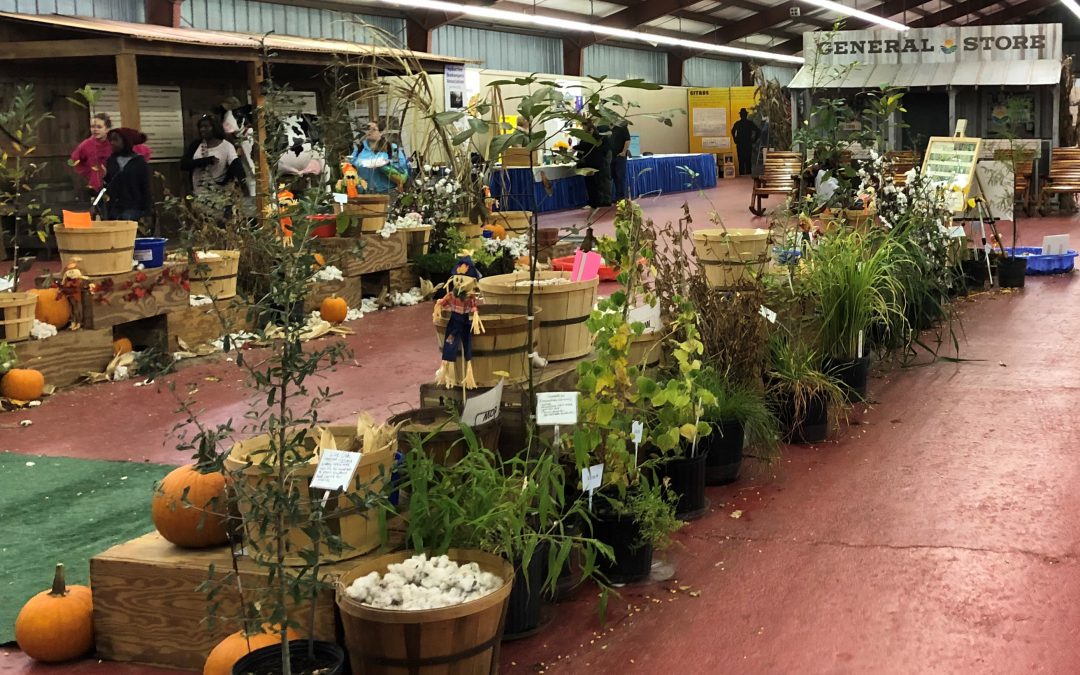
by Molly Jameson | Nov 7, 2019
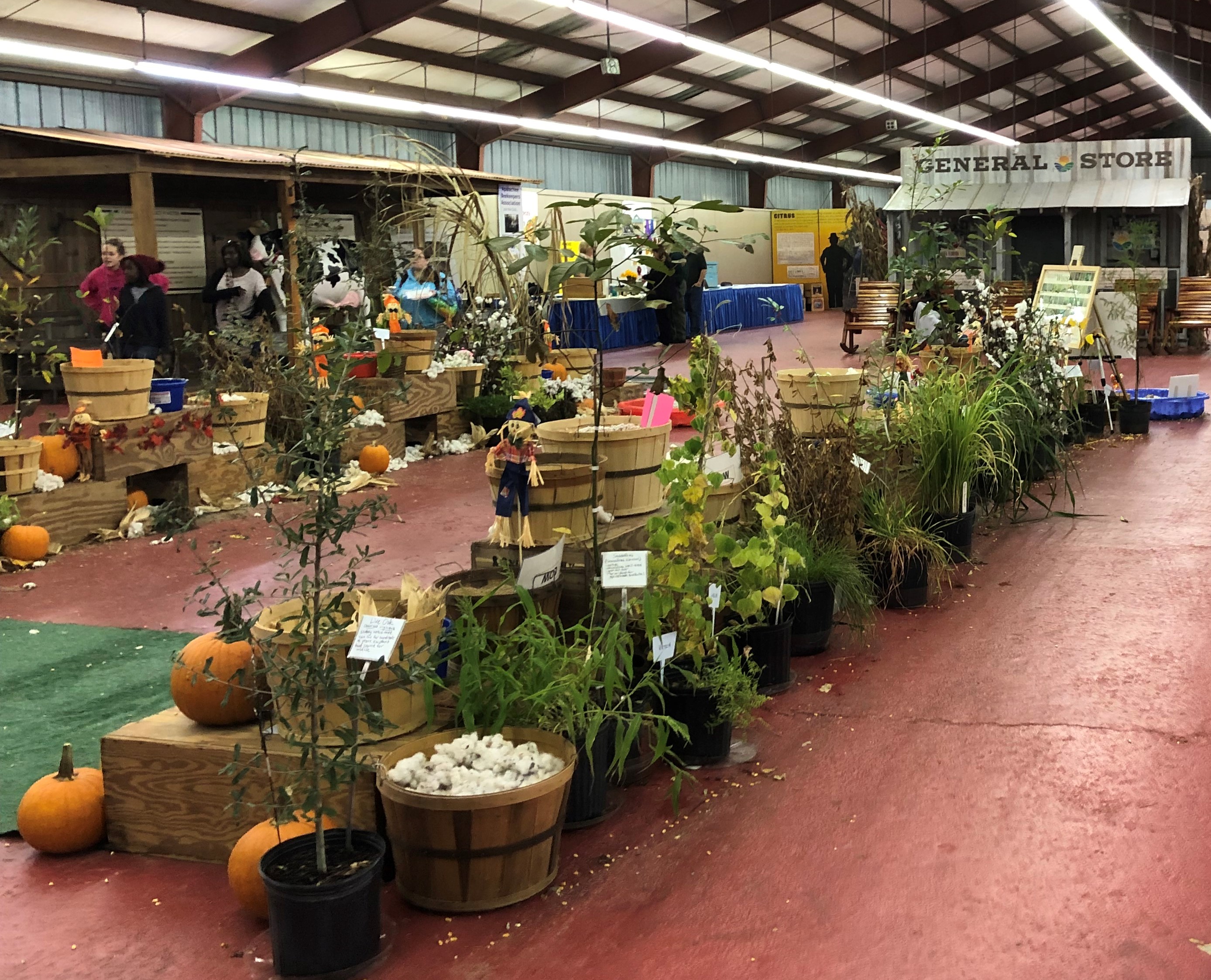
There are hands-on agricultural crop displays and much more in the UF/IFAS building at the North Florida Fair. Photo by Molly Jameson.
New Demonstrations in the UF/IFAS Extension Building at the North Florida Fair
Every year during the North Florida Fair in Tallahassee, extension agents from all over the Florida Panhandle showcase their various programming in the UF/IFAS exhibitor building. This includes educational displays and hands-on activities in areas such as horticulture, agriculture, livestock, 4-H youth, natural resources, and family and consumer sciences.

Once you have your fill of fair rides and funnel cake, see a live educational demonstration at the UF/IFAS building! Photo by Molly Jameson.
For instance, visitors can view and touch agricultural crops grown in our area, play in a giant tub of actual cotton, match images of song birds with their names, make a 4-H craft, and learn about the importance of wildlife habitat for animals.
This year, Extension is including even more to do and learn in the UF/IFAS building. There will be live demonstrations taking place throughout the fair week, which is November 7 to 17 this year.
Did you know you can convert recycled containers, such as milk jugs and soda bottles into self-watering planters? Or that when saltwater reef fishing, if fish are brought to the surface too quickly, it can rupture their organs? Learn all about these concepts and more during the UF/IFAS Extension Live Demonstrations.
UF/IFAS Live Demonstration Schedule:
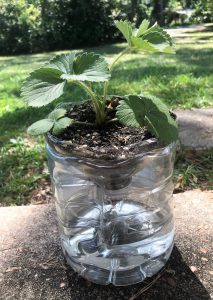
Turn all types of containers into self-watering gardens, such as planting a strawberry in a plastic jug using strips of old cloth as a wick. Photo by John Edwards.
Saturday, November 9:
- 1:00 p.m. – Food Safety with Extension Agent Kendra Zamojski
- 2:00 p.m. – Avoiding Barotrauma while Deep Sea Fishing with Extension Agent Andrea Albertin
Monday, November 11:
- 1:00 p.m. & 4:00 p.m. – Reef Fish Catch and Release Techniques with Extension Agent Laura Tiu
Tuesday, November 12:
- 6:30 p.m. – Rose Propagation with Extension Agent Matt Orwat
Thursday, November 14:
- 6:15 p.m. – Starting Plants in Recycled Newspaper with Extension Agent Paula Davis
- 7:00 p.m. – Food Safety with Extension Agents Laurie Osgood and Amy Mullins
Saturday, November 16:
- 3:00 p.m. – Planting with Recycled Containers with Extension Agents Molly Jameson, Mark Tancig, and Allison Leo
Sunday, November 17:
- 7:00 p.m. & 8:00 p.m. – Reef Fish Catch and Release Techniques with Extension Agent Erik Lovestrand
For more information about the North Florida Fair, visit the website at http://northfloridafair.com/.
See you at the fair!
by Molly Jameson | Jan 10, 2018
Every gardener should know a thing or two about farming. Join UF/IFAS Extension at the 2018 Panhandle Fruit and Vegetable Conference to not only learn about market vegetable production, fruit and nut production, and much more, but also to attend the pre-conference farm tour and listen to a speech by the Keynote Speaker, Dr. Joy Rumble, an Assistant Professor in the Department of Agricultural Education and Communication at the University of Florida.
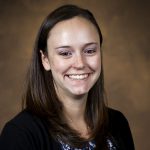
Dr. Joy Rumble, the 2018 Panhandle Fruit and Vegetable Conference Keynote Speaker.
Dr. Rumble is originally from Mount Gilead, Ohio. She earned a bachelor of science degree from The Ohio State University, majoring in animal science. During her undergraduate studies, Dr. Rumble raised livestock, worked as an intern on two large swine operations, and served as a summer intern for the USDA Farm Service Agency. She earned a master of science degree in agricultural communication and continued her education at the University of Florida, where she graduated with her doctorate in agricultural education and communication in 2013.
Dr. Rumble is now an Assistant Professor and Extension Programming Coordinator with the University of Florida. Her research focus is effective communication and raising awareness of agricultural and natural resources issues within the agricultural industry. She concentrates many of her outreach initiatives at the UF/IFAS Center for Public Issues Education in Agriculture and Natural Resources (PIE Center).
At the PIE Center, Dr. Rumble strives to measure knowledge, behaviors, and perceptions of agriculture of Florida constituents and responds to the many economic, environmental, and social challenges we face within the state. She often shares her findings through the Easy as PIE webinar series to allow both the public and Florida’s policymakers to make informed decisions to preserve the assets of the state’s agricultural and natural resources. Most recently, Dr. Rumble was a speaker for an Easy as PIE webinar to discuss a statewide strategic plan for agritourism.
Dr. Rumble’s service as the UF/IFAS Extension Programming Coordinator creates improved citizen awareness of agriculture and natural resources through UF/IFAS County Extension Offices.
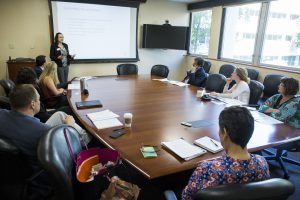
Dr. Rumble assisting with a UF/IFAS campus tour for Florida Senator Bill Nelson’s staff on October 18th, 2016.
Make plans to attend the 2018 Panhandle Fruit and Vegetable Conference on Tuesday, February 20, from 8 a.m. to 5 p.m., at the University of West Florida Conference Center (11000 Conference Parkway, Building 22) in Pensacola, Florida. You will learn about the importance of agricultural communication from Dr. Rumble directly, and attend conference educational tracts on North Florida Citrus Production, Fruit and Nut Production, Vegetable Production, Marketing, Food Safety, and Protected Agriculture. The conference will also provide an opportunity for networking and give you a chance to meet farmers from across our region.
Also included in the conference ticket price is the pre-conference “Buy Local” farm tour on Monday, February 19, 1 p.m. to 8 p.m. Tour buses will start out at the University of West Florida and will make three stops, traveling to the Gulf Coast Research and Extension Center in Fairhope, Alabama, a hydroponic vegetable farm in Daphne, Alabama, and the Allegri Farm Market, also in Daphne, Alabama.
For more information and registration visit https://pfvc2.eventbrite.com. Early bird registration is $50 (+ service fee), before February 1, 2018. Your registration includes continental breakfast, lunch, refreshments, educational materials, and transportation to the farm tour locations. We look forward to seeing you there!
by Molly Jameson | May 11, 2017
If you are a farmer, you have most likely heard about the Food Safety Modernization Act, or FSMA, by now. If you are not a farmer, you probably do not know that food safety regulations are going through a big change. The FSMA, which was passed in 2011, is considered the largest update to food safety regulation in over 80 years.
The proposed produce safety rule under the FSMA is very robust, establishing the minimum standards for worker training, health and hygiene, agricultural water use, animal soil amendments, on-farm domesticated and wild animals, equipment, tools, buildings, and sprout production.
But this new rule will not apply to all farmers. The commodities they produce and the value of their produce sold will ultimately dictate whether they will need to comply.
First, the rule does not apply to produce that is not a raw agricultural commodity, or commodities the Food and Drug Administration (FDA) has identified as “rarely consumed raw.” Secondly, if a farm has an average value of produce sold of $25,000 or less within the previous three years, they are also exempt.
If the farmer produces an agricultural commodity in which the rule applies and the value of their produce sold is over $25,000, it is still possible the farm will be exempt from most of the requirements.
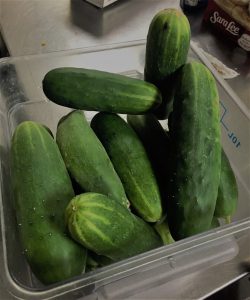
Fresh cucumbers, for example, are considered a raw commodity. But cucumbers that will undergo further processing, such as for pickling, would be eligible for exemption from the produce rule. Photo by Molly Jameson.
For instance, if the average annual monetary value of food sold directly to qualified end-users was more than the average annual value of the food sold to all other buyers within the previous three-year period, the farmer would meet the first half of exemption eligibility.
What is a “qualified end-user”, you ask? They are considered the consumers of the food, or restaurant or retail food establishment, located with the same state as the farm that produced the food (or no more than 275 miles).
But even if farmers meet the above exemption eligibility standards, they must also meet the second requirement. That is, the average annual monetary value of all food sold during the three-year period must be less than $500,000, when adjusted for inflation.
If this all sounds confusing, you are not alone! This is why the FDA developed a chart to help farmers determine if they will be exempt: Standards for Produce Safety – Coverage and Exemptions/Exclusions for Proposed 21 PART 112.
Whether farms will be exempt from the FSMA produce safety rule or not, it is always a good idea to follow good agricultural practices and to have a farm food safety plan. To learn more about food safety on farms, view the EDIS document Food Safety on the Farm: An Overview of Good Agricultural Practices.
If you are a farmer, or know someone who would benefit from having a food safety plan, the UF Small Farms Academy Extension Agents are offering a Building Your Own Farm’s Food Safety Manual Workshop in Tallahassee to help growers develop their own food safety manuals.
The workshop is tailored to fresh fruit and vegetable farms, fields, or greenhouses and is partially supported by a grant through the Florida Specialty Crops Block Grant program from the Florida Department of Agriculture and Consumer Service.
The registration fee is $35 for the first person representing a farm and $15 for an additional attendee from that farm. The workshop is limited to 20 farms on a first come, first serve basis.
The workshop will take place at the Amtrak Station, County Community Room, 918 Railroad Ave, in Tallahassee, FL, on Tuesday, May 23, 8:00 a.m. to 4:00 p.m. Register on Eventbrite by following this link: https://farmfoodsafetymanualworkshop.eventbrite.com
Please note, this class will help farmers develop their farm’s food safety manual, but it does not fulfill the new FDA FSMA one-time training requirement.







